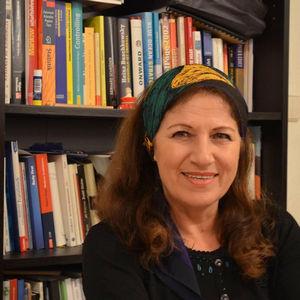Interview with longlisted author Sausan Jamil Hasan
20/02/2023

When did you begin writing My Name is Zayzafoune and where did the inspiration for it come from?
I began writing the novel at the start of 2020, after I was awarded a writing residency grant by the Ministry of Culture in Berlin. The grant was given to ten writers living in Berlin and writing in a language other than German. At the time, the corona crisis was exploding and getting worse all over the world, causing people to face big challenges and bigger existential questions, on individual and social levels.
While I was living in Berlin, while not forgetting the problem of my country and its ever-deepening crisis, grown so complex and intractable, yet with each passing day, questions burned in my heart and exhausted me as I thought about them. Questions arising from our tumultuous and messy reality. My memory assaulted me with all that I had experienced, witnessed and read, especially the experiences I had had through my job. As a doctor, I worked in a society slipping down into the dark pit of life, in an environment of corruption, oppression by those in power who conspired to control people’s destiny, and social, religious, political, economic and legal injustice. And among other things, there were inherited cultural customs and traditions. The segment of society most affected by injustice and violation of rights were women. Women were dominated by a patriarchal culture, their fathers’ authority, and unfair laws. This is what I found out through raw experience with my female patients, acquaintances, and even in the class of educated women, which included female doctors. In our environment, women cannot express themselves clearly. They are afraid of making their ideas known publicly and are often forced to find a way around things to get what they want, or to accept and submit. They are like all marginalised people, who are essential to life, but live without acknowledgement of their fair right to live like the rest of society. Of course, there are environments which are freer and more open when it comes to women, but even so these are limited and their influence is weak. I recalled the history I had lived through, and which lingered in my memory, from the mid-1960s until the moment I finished the novel. At that time, the world was shut down, and I was attempting to get to grips with and understand reality, in the face of the greater tragedy which befell my country.
Did the novel take long to write and where were you when you completed it?
The idea of the novel was sparked in my mind in the final months of 2019, and when the organisers informed me about my nomination for the residency grant, I carried on writing, and the work took roughly the whole of 2020. I was living in Berlin and didn’t leave it, but my relationship with my country is a permanent one. These days one can follow what is going on moment by moment, and I was in constant touch with what was happening there, and how life for people is becoming more wretched and their problems more complex, and how doors are being closed in their faces.
Do you have writing rituals?
In reality, many of those who have left their home countries, suffer before enjoying the circumstances which offer them the luxury of having writing rituals. For me, until now I haven’t been able to invent special rituals, since it has only been for about the last two years that I have lived in a home of my own. Before that, I was like any student seeking the tools to forge his future in a strange society, the first tool being to have a grasp of the language. I had to go to the German Language Learning Institute, even though it was hard for me, as I had passed the age when one learns a new language. I was also deprived of being able to use the language of my profession, as I couldn’t practice medicine in Germany. I made do with learning enough German to make daily life easier. My new life entailed writing articles in Arab newspapers, periodicals and websites, and this job also affected my ability to adopt writing rituals. So, I write in all situations and at all times, when the state of writing calls me, and when I have the right circumstances to begin.
What is your next literary project after this novel?
My literary project is the novel, and I gave up medicine early in my country Syria, for its sake, so that I could be a full-time writer, after I came to writing late. So, I am full of ideas and plans for novels. At the moment, I have a text which is almost completed and just needs a final review, and a project for another piece of writing. I have the general idea and maybe I will start writing it soon.
